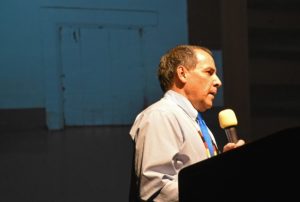Silent to their graves about Residential School trauma

By Kelly Anne Smith
NORTH BAY—For the third consecutive week in February, the number of people turning out for a two-hour Truth and Reconciliation learning opportunity steadily increased.
The night’s topic on Indian Residential Schools had about 250 people packed into the St. Joseph-Scollard Hall Theatre.
Nipissing First Nation Chief Scott McLeod was overwhelmed by the response from members of the public who came out to learn during the four-week joint effort by local school boards and community partners in both North Bay and Nipissing Nation.
The Chief had inspirational words about North Bay Mayor Al McDonald for his introduction.
“Your people are so strong,” Mayor McDonald replied. “I don’t know if I could forgive so easily.”
The night was conducted by George Couchie and a large team. Couchie acknowledged that the gathering took place on traditional territory of Nipissing First Nation.
Couchie showed a photo of Hopi men in prison for trying to stop the abduction of their own children. He said parents in Canada were jailed or fined for not sending children to Residential School.
“They are all around us, those who have risen above Indian Residential School,” stated Couchie.
Zachary Beaudette, Blair Beaucage, and Tory Fisher sang for the opening of the event. Couchie pointed out that we were looking at and hearing the voices of the future: Ojibway teachers.
Children were yanked from their mother’s arms and sent to an institution where their hair was cut – culturally an act of grief, their clothes taken, and their identities stripped to only a mere number. The children developed Post Traumatic Stress Disorder (PTSD). Five-year-olds were not allowed to go home for three years.
George Couchie shared his personal story of how he and his family were affected by the Indian Residential School system. The entire theatre seemed to be holding back tears or quietly weeping.
A woman brought forward a smudge to cleanse for a healing way forward. Later, the smell of burning sage lingered reminding me of the evening’s dramatic teachings. The neighbours all around us and their ancestors rose above the atrocities the Canadian government and others in positions of power forced on them as children.
Couchie talked of intergenerational impacts of the Residential School system and how he stopped the ripple effect in his own family. Never drinking or taking drugs, he and his wife Wendy lived in a good way for their children to model.
J.P. Spence addressed the theatre as the son of a Residential Survivor. He calls himself lucky that his dad and mother, a nurse, provided a loving family life.
“My mother was the foundation of why he didn’t fall into alcoholism or any kind of negative journey in his life,” expressed Spence. “We didn’t grow up with any family violence. We were very fortunate to have positive structure.”
Couchie said he wasn’t there to lay blame or to make anybody feel guilty; but rather shed light on the fact that many men will go to their graves having been silent about their experience at Residential Schools. 25 percent of children never made it home.
Someone asked about the truth to an electric chair being used to torture boys at St. Anne’s Residential School. Peter Wynne spoke up and said an old tractor battery powered the electric chair for the amusement of visiting priests.
Wynne went to St. Anne’s.
“Society is calling us survivors, but I like to think I’ve risen above that,” stated Wynn.
He offered wisdom to the gathering.
“Utilize our ceremonies. That is our saving grace. It works,” noted Wynne, adding to look within yourself to find the answers. “It takes a lot of hard work.”
As the crowd stood and clapped at the end of the evening, they did so with heavy hearts. There was a collective sadness for the vulnerable, innocent children, their families, and communities who all suffered.
George Couchie told the crowd that everyone has a story we must listen to.
A gentleman walking to his car stopped to suggest that even more people should come out to listen. I asked if Indigenous people as well, to which he replied, “Yes. We never knew about Residential Schools. We have to find out about what happened, ask questions and understand.”
The Kina maamwi gdoo-wiikendaasmin working group is comprised of the following community members: J.P. Spence, Anishinabek Police Service Constable; Scott Tod, Deputy Chief of Police of North Bay Police Service; Tory Fisher, Ojibway Teacher with the Nipissing-Parry Sound Catholic District School Board; Blair Beaucage, Ojibway Teacher at Nbisiing Secondary School; Sacha Stevens, Teacher with the Nipissing-Parry Sound Catholic District School Board; Alysha Allaire, Teacher with Near North District School Board; Amanda Mizzi, Coordinator of Aboriginal Education with Near North District School Board; Nipissing First Nation Chief Scott McLeod; North Bay Mayor Al McDonald; Steve Chadbert; Robert Couchie, Department of History at Nipissing University; Zachary Beaudette, Faculty for First Peoples’ Centre with Canadore College; and Brenda Avery.

